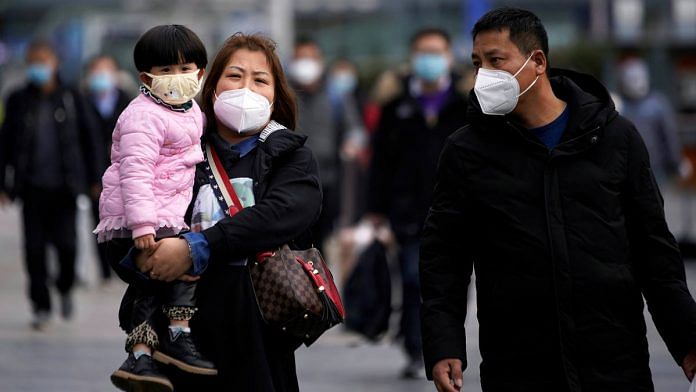The coronavirus seems to be near the tipping point of becoming a global pandemic. The next few weeks may see infection rates peak for the virus that causes a lung illness dubbed Covid-19 and start to decline, aided by containment efforts and warmer weather in the Northern hemisphere. It seems just as likely that won’t happen, which means that in addition to humanitarian concerns, investors have to think about the impact on their portfolios.
There is a tendency for investors to concentrate on the direct short-term effects. Fears of contagion have already caused the cancellation of travel and events in parts of the world, and disrupted supply chains. This will have significant impact on first-quarter earnings and the global economy even if the virus is contained by the end of March.
But these effects are likely temporary. If someone cancels a cruise or trip to China because of Covid-19 fears, it won’t change their long-term allocation to travel spending. They’ll take another trip another time. If phone prices increase due to a shortage of parts, it won’t reduce the number of phones people buy; the pent-up demand will be satisfied when parts finally arrive and prices fall.
The long-term effects of Covid-19 are in some respects opposite to the short-term ones. Recent studies suggest the virus transmission rate is higher than initially thought, and that many more people are infected than estimated. That’s bad for containment, and increases short-term fear. But the corollary is that death rates may be lower than initially thought, because the number of deaths (which is known with more accuracy than the number of people infected) should be divided by a larger denominator. A faster-spreading, less deadly virus may do less permanent economic damage.
At this point there are three main scenarios. The first is that Covid-19 may be contained and eliminated as a public health threat, the way the severe acute respiratory syndrome, or SARS, was. In this case, there’s no reason to expect significant long-term investment effect.
Also read: Coronavirus spread could cast a pall over Tokyo Olympics
The second is that Covid-19 becomes endemic. This is not a horrifying scenario. There are four other coronaviruses out there already, which together cause about 25% of colds. One more might not make that much difference. In fact, the introduction of a new virus has complex effects on public health as it can change patterns of infection of all other common illnesses. So while this would be a bad thing, and we would prefer to contain Covid-19, it probably means an uptick in the number and possibly the severity of colds. Against this is the continuing improvement of medical knowledge to reduce the incidence and severity of disease. I don’t think this scenario justifies predicting a significant decline in overall global public health.
The third is the worst, which is that Covid-19 grows into a global pandemic, perhaps as bad or worse as the 1918 influenza. To be sure, global pandemics were always a possibility. The question isn’t the probability of a major catastrophe, but whether that probability is significantly higher than six months ago.
And we shouldn’t just look at the possibility of a coronavirus pandemic, as there are plenty of other candidates for pandemic (influenza, filovirus, Lassa Fever, Rift Valley Fever and Crimean Congo Hemorrhagic Fever are the main known ones, plus unknown ones can emerge). Plus, there are many other possible disasters: tick or other infestations, diseases like rabies spread by animals, destruction of food crops, volcanoes, earthquakes, climate change, asteroid impacts, etc. Before altering a long-term strategy, investors should ask if the information about Covid-19 to date has significantly changed the probability of a mass-death event over the next few decades.
To put some numbers around this, I took a model developed in 2017 and published by the World Health Organization for the health and economic effects of possible pandemics. This covers only influenza and coronavirus risks. The model shows no sign of pandemic in 84 years out of 100, and expected global deaths from the two viruses are 200,000, while global gross income is reduced by 0.2%. But in 8 years out of 100 the model predicts an event that kills an expected one million people and cut global gross income for the year by 1%.
At the extreme, there is about one chance in 2,000 of a 1918-flu level event with an expected 300 million deaths and wealth destruction of 2.5 years of global income.
We are still at a point where our first scenario, containment, is possible. In that case we would expect total influenza and coronavirus deaths in 2020 to be around average.
In our second scenario, where Covid-19 becomes endemic, we might see the numbers in the first line of the table tick upward somewhat, say to 210,000 deaths and a 0.21% drop in global gross income. But it’s hard to see that having a significant long-term investment implication.
It is the third scenario, major pandemic, that causes the greatest damage. But the probabilities of that are still quite small, even if they are somewhat higher than the model (which was developed before Covid-19 emerged) suggests. Moreover, a Covid-19 pandemic is only one of many possible causes of a mass disaster, so it probably does not add significantly to the overall probability.
Recent news is making the second scenario seem more likely, and the first and third less likely. While the humanitarian implications of that are debatable, from an investor’s standpoint it’s clear good news. As far as I’m concerned, this means Covid-19 remains a public health issue, it is not a reason for long-term investors to adjust portfolios.- Bloomberg
Also read: A kiss is just a kiss except when it spreads the coronavirus



